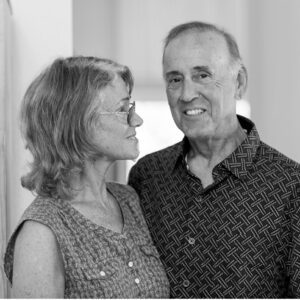Phil, living with ATTR
Prior to March of 2018, Phil rarely went to the doctor. In fact, he didn’t even have a primary care physician. At 71 years old, he biked 100 to 140 miles a week, swam, did triathlons, and ran marathons. Not only that, but his family had no history of disease—with some relatives who had lived into their hundreds.
But after developing sudden bladder pain and noticing blood in his urine, he made an appointment right away with a urologist. The good news: it probably wasn’t cancer. The bad news: he would need to see a cardiologist.
“I’ve got this bladder problem that’s keeping me up 14 to 18 times a night in excruciating pain. And they send me to a cardiologist?” Phil recalls thinking.

His heart tests revealed an unexpected diagnosis: transthyretin amyloidosis, or ATTR. The disease causes misfolded proteins to accumulate in organs, causing toxicity. While some forms of the disease are inherited, Phil’s was caused by age. This form of ATTR is known as wild-type TTR amyloidosis cardiomyopathy, or wtATTR-CM.
“He’d be the last person that you would think would have cardiomyopathy,” says Phil’s partner Pam, who began accompanying Phil to his many doctor’s appointments.
At one appointment, Phil learned that his disease was causing irregular heartbeat—with periods of ventricular tachycardia, or an accelerated heart rate. To prevent any potentially fatal consequences, Phil’s medical team recommended a surgically implanted pacemaker. “Sick, old people have pacemakers, not someone like me who’s been active all my life,” says Phil, who conceded to his doctors’ advice.
While grappling with his new diagnosis and juggling hospital visits, Phil says he also struggled with uncertainty surrounding the progression of his ATTR: “how debilitating is it going to be for me? Is it going to impact my life so that I can’t do things I want to do?”
Yet, through this process, Phil has remained strong and positive—something he attributes to the support he receives from Pam and his ATTR support group. “I learned for the first time that when someone in a relationship gets a disease, you both have it,” he says. “I don’t know how I could have handled it if I was alone.”
Phil continues to be optimistic that a treatment will be available soon, hopefully in his lifetime, and stays abreast of the quickly-emerging medical knowledge about ATTR. “This is a good time to have the disease, if there ever was. And it’s only going to get better,” he says.
“Any disease can strike any one of us at any point, and you never know what’s going to happen,” Pam adds. “Phil’s got a really wonderful attitude about life and I think he’s a fighter. He believes in his body’s ability to heal. And I think those sorts of things, energetically, can really help.”